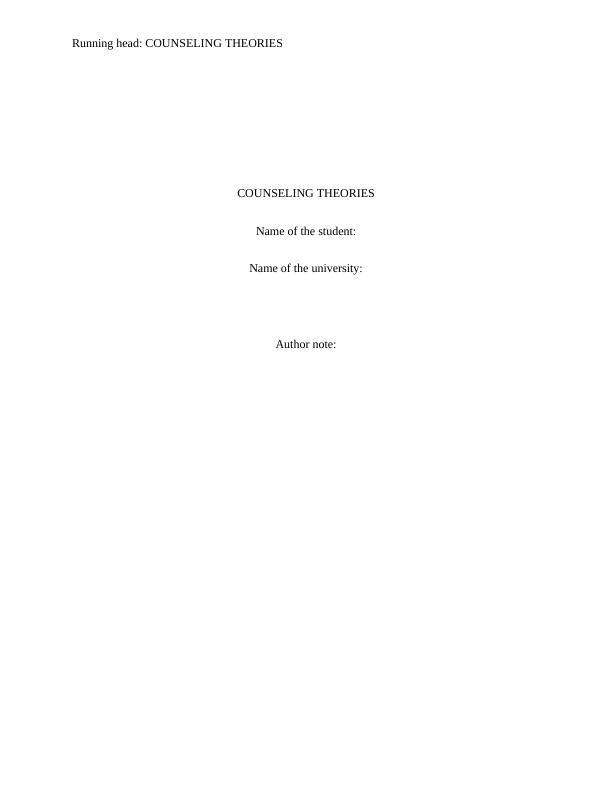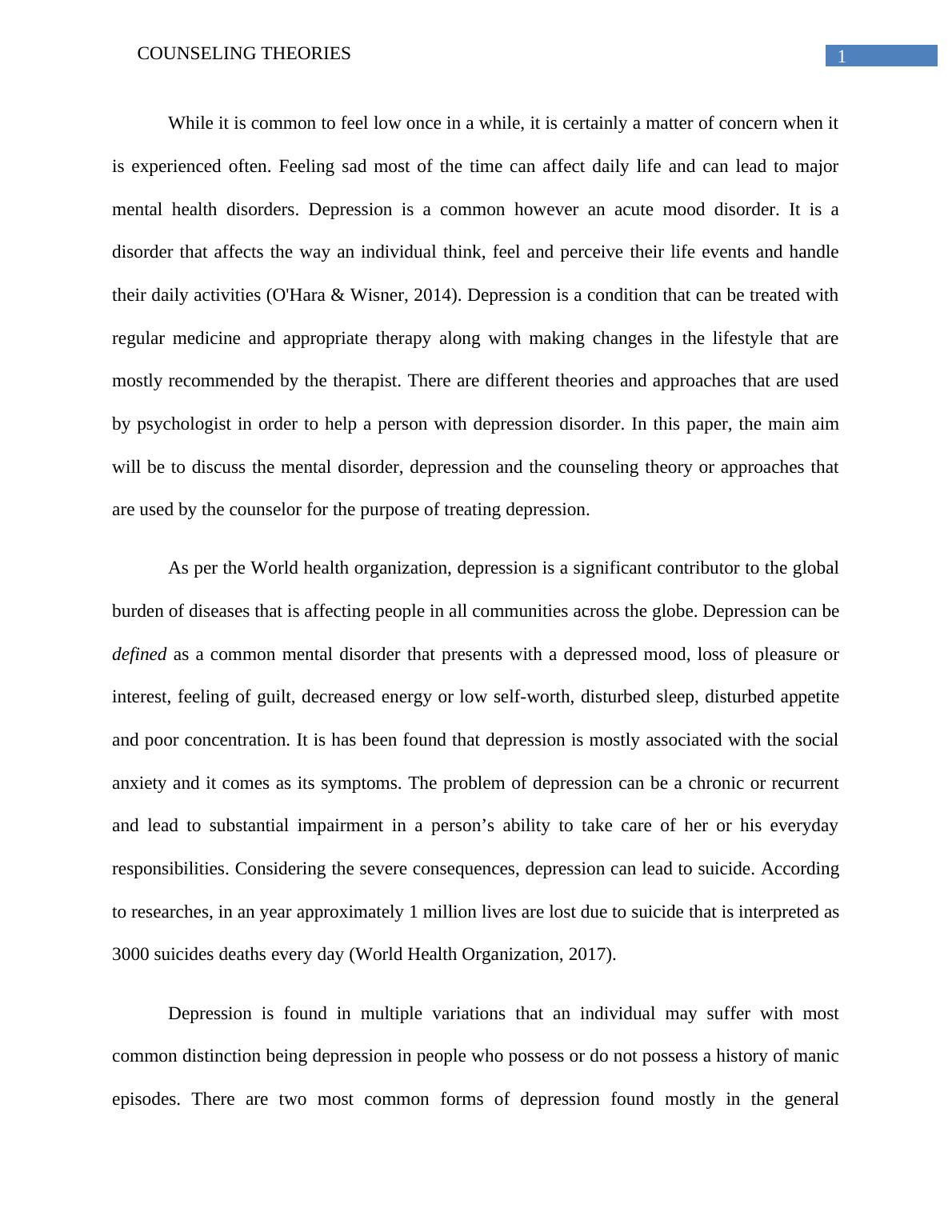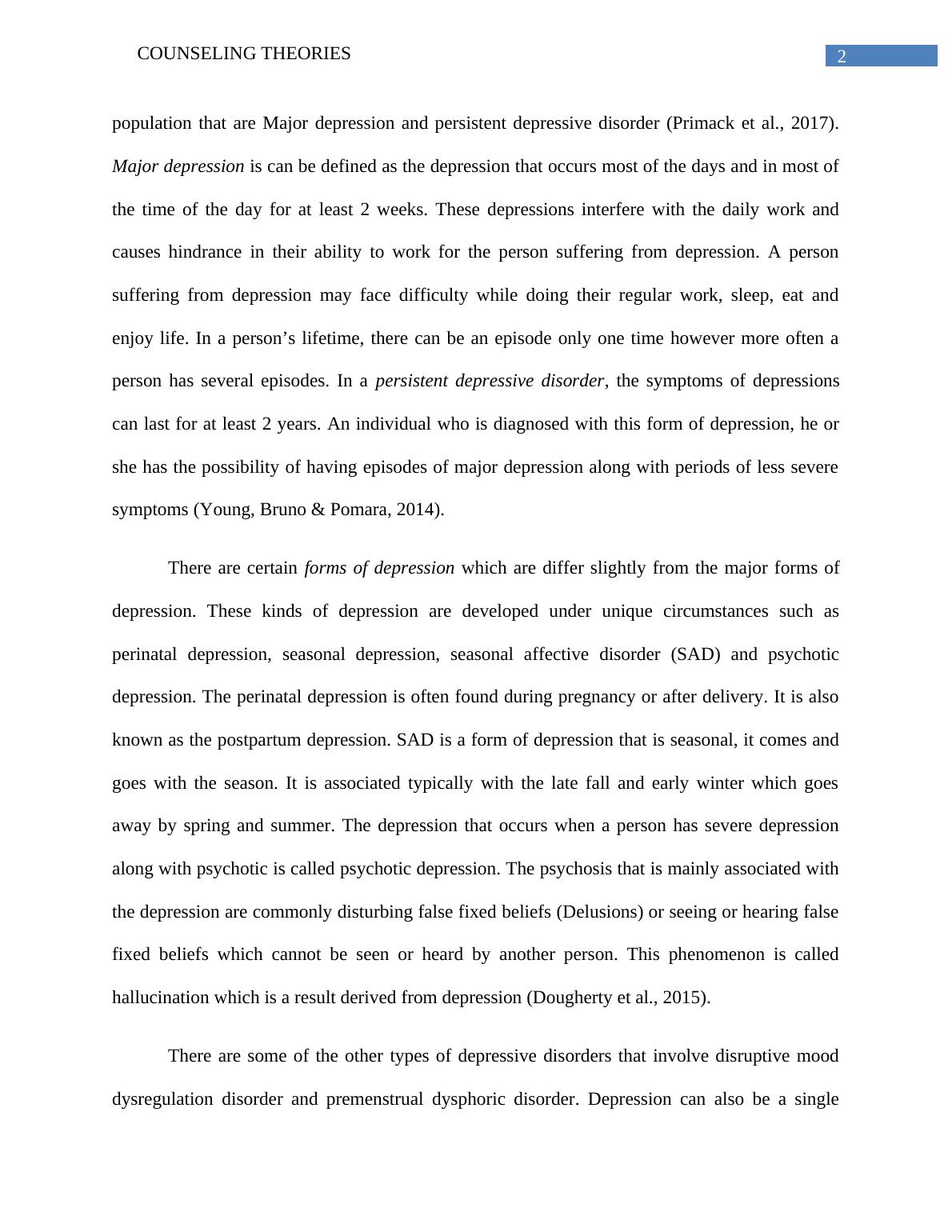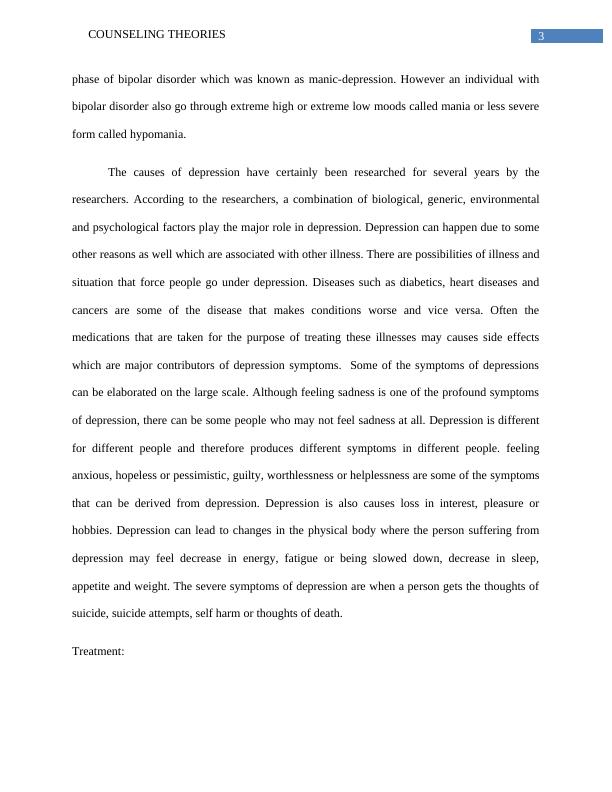Counseling Theories for Treating Depression
Added on 2023-03-17
11 Pages3300 Words82 Views
Running head: COUNSELING THEORIES
COUNSELING THEORIES
Name of the student:
Name of the university:
Author note:
COUNSELING THEORIES
Name of the student:
Name of the university:
Author note:

1COUNSELING THEORIES
While it is common to feel low once in a while, it is certainly a matter of concern when it
is experienced often. Feeling sad most of the time can affect daily life and can lead to major
mental health disorders. Depression is a common however an acute mood disorder. It is a
disorder that affects the way an individual think, feel and perceive their life events and handle
their daily activities (O'Hara & Wisner, 2014). Depression is a condition that can be treated with
regular medicine and appropriate therapy along with making changes in the lifestyle that are
mostly recommended by the therapist. There are different theories and approaches that are used
by psychologist in order to help a person with depression disorder. In this paper, the main aim
will be to discuss the mental disorder, depression and the counseling theory or approaches that
are used by the counselor for the purpose of treating depression.
As per the World health organization, depression is a significant contributor to the global
burden of diseases that is affecting people in all communities across the globe. Depression can be
defined as a common mental disorder that presents with a depressed mood, loss of pleasure or
interest, feeling of guilt, decreased energy or low self-worth, disturbed sleep, disturbed appetite
and poor concentration. It is has been found that depression is mostly associated with the social
anxiety and it comes as its symptoms. The problem of depression can be a chronic or recurrent
and lead to substantial impairment in a person’s ability to take care of her or his everyday
responsibilities. Considering the severe consequences, depression can lead to suicide. According
to researches, in an year approximately 1 million lives are lost due to suicide that is interpreted as
3000 suicides deaths every day (World Health Organization, 2017).
Depression is found in multiple variations that an individual may suffer with most
common distinction being depression in people who possess or do not possess a history of manic
episodes. There are two most common forms of depression found mostly in the general
While it is common to feel low once in a while, it is certainly a matter of concern when it
is experienced often. Feeling sad most of the time can affect daily life and can lead to major
mental health disorders. Depression is a common however an acute mood disorder. It is a
disorder that affects the way an individual think, feel and perceive their life events and handle
their daily activities (O'Hara & Wisner, 2014). Depression is a condition that can be treated with
regular medicine and appropriate therapy along with making changes in the lifestyle that are
mostly recommended by the therapist. There are different theories and approaches that are used
by psychologist in order to help a person with depression disorder. In this paper, the main aim
will be to discuss the mental disorder, depression and the counseling theory or approaches that
are used by the counselor for the purpose of treating depression.
As per the World health organization, depression is a significant contributor to the global
burden of diseases that is affecting people in all communities across the globe. Depression can be
defined as a common mental disorder that presents with a depressed mood, loss of pleasure or
interest, feeling of guilt, decreased energy or low self-worth, disturbed sleep, disturbed appetite
and poor concentration. It is has been found that depression is mostly associated with the social
anxiety and it comes as its symptoms. The problem of depression can be a chronic or recurrent
and lead to substantial impairment in a person’s ability to take care of her or his everyday
responsibilities. Considering the severe consequences, depression can lead to suicide. According
to researches, in an year approximately 1 million lives are lost due to suicide that is interpreted as
3000 suicides deaths every day (World Health Organization, 2017).
Depression is found in multiple variations that an individual may suffer with most
common distinction being depression in people who possess or do not possess a history of manic
episodes. There are two most common forms of depression found mostly in the general

2COUNSELING THEORIES
population that are Major depression and persistent depressive disorder (Primack et al., 2017).
Major depression is can be defined as the depression that occurs most of the days and in most of
the time of the day for at least 2 weeks. These depressions interfere with the daily work and
causes hindrance in their ability to work for the person suffering from depression. A person
suffering from depression may face difficulty while doing their regular work, sleep, eat and
enjoy life. In a person’s lifetime, there can be an episode only one time however more often a
person has several episodes. In a persistent depressive disorder, the symptoms of depressions
can last for at least 2 years. An individual who is diagnosed with this form of depression, he or
she has the possibility of having episodes of major depression along with periods of less severe
symptoms (Young, Bruno & Pomara, 2014).
There are certain forms of depression which are differ slightly from the major forms of
depression. These kinds of depression are developed under unique circumstances such as
perinatal depression, seasonal depression, seasonal affective disorder (SAD) and psychotic
depression. The perinatal depression is often found during pregnancy or after delivery. It is also
known as the postpartum depression. SAD is a form of depression that is seasonal, it comes and
goes with the season. It is associated typically with the late fall and early winter which goes
away by spring and summer. The depression that occurs when a person has severe depression
along with psychotic is called psychotic depression. The psychosis that is mainly associated with
the depression are commonly disturbing false fixed beliefs (Delusions) or seeing or hearing false
fixed beliefs which cannot be seen or heard by another person. This phenomenon is called
hallucination which is a result derived from depression (Dougherty et al., 2015).
There are some of the other types of depressive disorders that involve disruptive mood
dysregulation disorder and premenstrual dysphoric disorder. Depression can also be a single
population that are Major depression and persistent depressive disorder (Primack et al., 2017).
Major depression is can be defined as the depression that occurs most of the days and in most of
the time of the day for at least 2 weeks. These depressions interfere with the daily work and
causes hindrance in their ability to work for the person suffering from depression. A person
suffering from depression may face difficulty while doing their regular work, sleep, eat and
enjoy life. In a person’s lifetime, there can be an episode only one time however more often a
person has several episodes. In a persistent depressive disorder, the symptoms of depressions
can last for at least 2 years. An individual who is diagnosed with this form of depression, he or
she has the possibility of having episodes of major depression along with periods of less severe
symptoms (Young, Bruno & Pomara, 2014).
There are certain forms of depression which are differ slightly from the major forms of
depression. These kinds of depression are developed under unique circumstances such as
perinatal depression, seasonal depression, seasonal affective disorder (SAD) and psychotic
depression. The perinatal depression is often found during pregnancy or after delivery. It is also
known as the postpartum depression. SAD is a form of depression that is seasonal, it comes and
goes with the season. It is associated typically with the late fall and early winter which goes
away by spring and summer. The depression that occurs when a person has severe depression
along with psychotic is called psychotic depression. The psychosis that is mainly associated with
the depression are commonly disturbing false fixed beliefs (Delusions) or seeing or hearing false
fixed beliefs which cannot be seen or heard by another person. This phenomenon is called
hallucination which is a result derived from depression (Dougherty et al., 2015).
There are some of the other types of depressive disorders that involve disruptive mood
dysregulation disorder and premenstrual dysphoric disorder. Depression can also be a single

3COUNSELING THEORIES
phase of bipolar disorder which was known as manic-depression. However an individual with
bipolar disorder also go through extreme high or extreme low moods called mania or less severe
form called hypomania.
The causes of depression have certainly been researched for several years by the
researchers. According to the researchers, a combination of biological, generic, environmental
and psychological factors play the major role in depression. Depression can happen due to some
other reasons as well which are associated with other illness. There are possibilities of illness and
situation that force people go under depression. Diseases such as diabetics, heart diseases and
cancers are some of the disease that makes conditions worse and vice versa. Often the
medications that are taken for the purpose of treating these illnesses may causes side effects
which are major contributors of depression symptoms. Some of the symptoms of depressions
can be elaborated on the large scale. Although feeling sadness is one of the profound symptoms
of depression, there can be some people who may not feel sadness at all. Depression is different
for different people and therefore produces different symptoms in different people. feeling
anxious, hopeless or pessimistic, guilty, worthlessness or helplessness are some of the symptoms
that can be derived from depression. Depression is also causes loss in interest, pleasure or
hobbies. Depression can lead to changes in the physical body where the person suffering from
depression may feel decrease in energy, fatigue or being slowed down, decrease in sleep,
appetite and weight. The severe symptoms of depression are when a person gets the thoughts of
suicide, suicide attempts, self harm or thoughts of death.
Treatment:
phase of bipolar disorder which was known as manic-depression. However an individual with
bipolar disorder also go through extreme high or extreme low moods called mania or less severe
form called hypomania.
The causes of depression have certainly been researched for several years by the
researchers. According to the researchers, a combination of biological, generic, environmental
and psychological factors play the major role in depression. Depression can happen due to some
other reasons as well which are associated with other illness. There are possibilities of illness and
situation that force people go under depression. Diseases such as diabetics, heart diseases and
cancers are some of the disease that makes conditions worse and vice versa. Often the
medications that are taken for the purpose of treating these illnesses may causes side effects
which are major contributors of depression symptoms. Some of the symptoms of depressions
can be elaborated on the large scale. Although feeling sadness is one of the profound symptoms
of depression, there can be some people who may not feel sadness at all. Depression is different
for different people and therefore produces different symptoms in different people. feeling
anxious, hopeless or pessimistic, guilty, worthlessness or helplessness are some of the symptoms
that can be derived from depression. Depression is also causes loss in interest, pleasure or
hobbies. Depression can lead to changes in the physical body where the person suffering from
depression may feel decrease in energy, fatigue or being slowed down, decrease in sleep,
appetite and weight. The severe symptoms of depression are when a person gets the thoughts of
suicide, suicide attempts, self harm or thoughts of death.
Treatment:

End of preview
Want to access all the pages? Upload your documents or become a member.
Related Documents
Case Study of Mental Health and Physical Healthlg...
|14
|4050
|102
Mental Health - Bipolar Disorderlg...
|17
|4429
|63
Bipolar Disorder | Assignment - PSYCH 650lg...
|4
|553
|47
(PDF) Bipolar Affective Disorderlg...
|8
|2099
|43
Counselling Theories: Understanding Depression and Psychoanalytic and CBT Strategieslg...
|13
|3688
|299
Mental Health: Care Options for Bipolar Disorder Patientlg...
|10
|3268
|73
